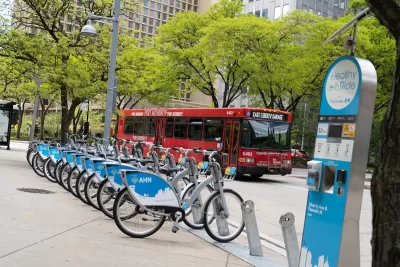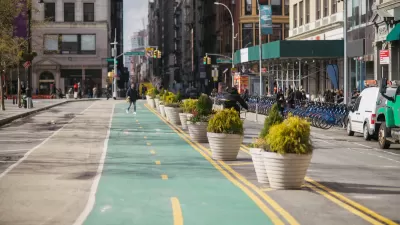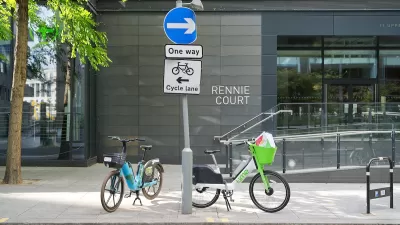For shared mobility to succeed, systems must tap into the connectivity and funding potential offered by closer collaboration with public transit.

Leaders in the shared bike and scooter industry are renewing a call to better integrate micromobility with public transit to connect to public funding and create more comprehensive transit networks.
Writing in GovTech, Skip Descant describes the experiences shared by micromobility operators from around the country in a North American Bikeshare and Scootershare Association (NABSA) webinar.
In Eugene, Oregon, the nonprofit-operated bike share system relies on fare revenue for 25 percent of its income, while the rest comes from a combination of local, state, and federal sources. “In the San Francisco Bay Area, the Metropolitan Transportation Commission (MTC) invested some $20 million from its transportation electrification initiative — which generally funds the acquisition of e-buses or other forms of electrifying transportation — toward the Bay Wheels bike-share program.” E-bikes are becoming a popular addition to shared mobility fleets, making them more inclusive and accessible for more riders.
FULL STORY: To Fund Micromobility, Connect It to Public Transit

Alabama: Trump Terminates Settlements for Black Communities Harmed By Raw Sewage
Trump deemed the landmark civil rights agreement “illegal DEI and environmental justice policy.”

Planetizen Federal Action Tracker
A weekly monitor of how Trump’s orders and actions are impacting planners and planning in America.

The 120 Year Old Tiny Home Villages That Sheltered San Francisco’s Earthquake Refugees
More than a century ago, San Francisco mobilized to house thousands of residents displaced by the 1906 earthquake. Could their strategy offer a model for the present?

In Both Crashes and Crime, Public Transportation is Far Safer than Driving
Contrary to popular assumptions, public transportation has far lower crash and crime rates than automobile travel. For safer communities, improve and encourage transit travel.

Report: Zoning Reforms Should Complement Nashville’s Ambitious Transit Plan
Without reform, restrictive zoning codes will limit the impact of the city’s planned transit expansion and could exclude some of the residents who depend on transit the most.

Judge Orders Release of Frozen IRA, IIJA Funding
The decision is a victory for environmental groups who charged that freezing funds for critical infrastructure and disaster response programs caused “real and irreparable harm” to communities.
Urban Design for Planners 1: Software Tools
This six-course series explores essential urban design concepts using open source software and equips planners with the tools they need to participate fully in the urban design process.
Planning for Universal Design
Learn the tools for implementing Universal Design in planning regulations.
Clanton & Associates, Inc.
Jessamine County Fiscal Court
Institute for Housing and Urban Development Studies (IHS)
City of Grandview
Harvard GSD Executive Education
Toledo-Lucas County Plan Commissions
Salt Lake City
NYU Wagner Graduate School of Public Service





























